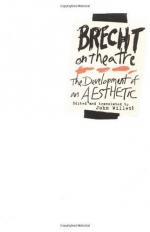
|
| Name: _________________________ | Period: ___________________ |
This test consists of 5 multiple choice questions, 5 short answer questions, and 10 short essay questions.
Multiple Choice Questions
1. In Life of Galileo, the child's true mother is found by means of a _____.
(a) Ouija board.
(b) Seance.
(c) Chalk circle.
(d) Native totem.
2. Where did Helene Weigel give acting lessons at theatre school, possibly using Brecht's list of exercises?
(a) Finland.
(b) Paris.
(c) Moscow.
(d) Scotland.
3. The actor first masters his character by mastering the _____.
(a) Lines.
(b) Gest.
(c) Stage.
(d) Story.
4. Epic theatre strives to achieve a character rather than a _____.
(a) Singer.
(b) Dilettant.
(c) Corporal.
(d) Caricature.
5. The actor masters his character by paying critical attention to its _____.
(a) Manifold utterances.
(b) Patterns of speech.
(c) Mannerisms.
(d) Dialectic inflections.
Short Answer Questions
1. In Life of Galileo, Richard Gloster courts _____.
2. Where did the production of Galileo go in December, 1947?
3. The expressionism of the postwar period showed the World as Will and Idea and led to a special kind of _____.
4. In terms of aesthetics, Galileo spoke of the elegance of certain _____.
5. The rapid decline of artistic methods under the Nazis seemed to Brecht to have take place _____.
Short Essay Questions
1. What is Brecht's view on costumes and masks?
2. What system of production is present in bourgeois society?
3. What is Brecht's view on run-throughs?
4. What does theatre show us about the structure of society and how is this represented?
5. What is Brecht's definition of theatre?
6. How does Brecht say that the new sciences affect humanity?
7. What does Brecht see as the reasons for lifeless and stereotyped portrayals of characters by actors?
8. What is Brecht's view on previews?
9. Why did the actors sit openly on the stage in Neher's production of Antigone?
10. How does Brecht describe his cities after the great war in "From the Mother Courage Model"?
|
This section contains 610 words (approx. 3 pages at 300 words per page) |

|




